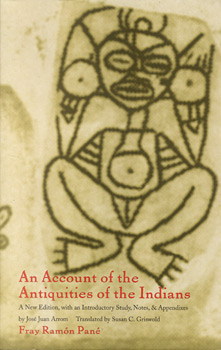
[an error occurred while processing this directive]
Edited by the noted Hispanist Jose Juan Arrom, this current edition is the only surviving direct source of information about the myths, ceremonies, and lives of the New World inhabitants whom Columbus first encountered. Pané's pioneering account contains many linguistic and cultural observations, including descriptions of the Indians' healing rituals and their beliefs about their souls after death. He provides the first known account of the use of tobacco and recounts the use of idols in ritual ceremonies. The names, functions, and attributes of native gods, the mythological origin of the aboriginal people's attitudes toward sex and gender, and their rich stories of creation are described as well.
-- Patricia Seed, Rice University
"[This book] is important for the way in which it anticipates some of the main issues concerning the production of Latin American literature."
-- Roberto Gonzalez Echevarria, author of Myth and Archive: A Theory of Latin American Narrative
BACK COVER #
With Columbus on his second voyage to the New World in 1494 was a young friar named Ramón Pané. The friar's assignment was to live among the "Indians" whom Columbus had "discovered" on the island of Hispaniola and to learn their language and write a record of their lives and beliefs. The culture of these Indians is not extinct-the native population had all but disappeared by 1530--and the material remnants of their society have only in the last year been "rediscovered" at locations in Cuba and the Dominican Republic. The written record produced by Pané, however, has survived and is available for the first time in English as an independent text in its own right, complete with the latest anthropological research on these early people.Edited by the noted Hispanist Jose Juan Arrom, this current edition is the only surviving direct source of information about the myths, ceremonies, and lives of the New World inhabitants whom Columbus first encountered. Pané's pioneering account contains many linguistic and cultural observations, including descriptions of the Indians' healing rituals and their beliefs about their souls after death. He provides the first known account of the use of tobacco and recounts the use of idols in ritual ceremonies. The names, functions, and attributes of native gods, the mythological origin of the aboriginal people's attitudes toward sex and gender, and their rich stories of creation are described as well.
BLURBS #
"[This is a] highly accessible English translation . . . [of] the earliest work dealing with the indigenous inhabitants of the New World."-- Patricia Seed, Rice University
"[This book] is important for the way in which it anticipates some of the main issues concerning the production of Latin American literature."
-- Roberto Gonzalez Echevarria, author of Myth and Archive: A Theory of Latin American Narrative


